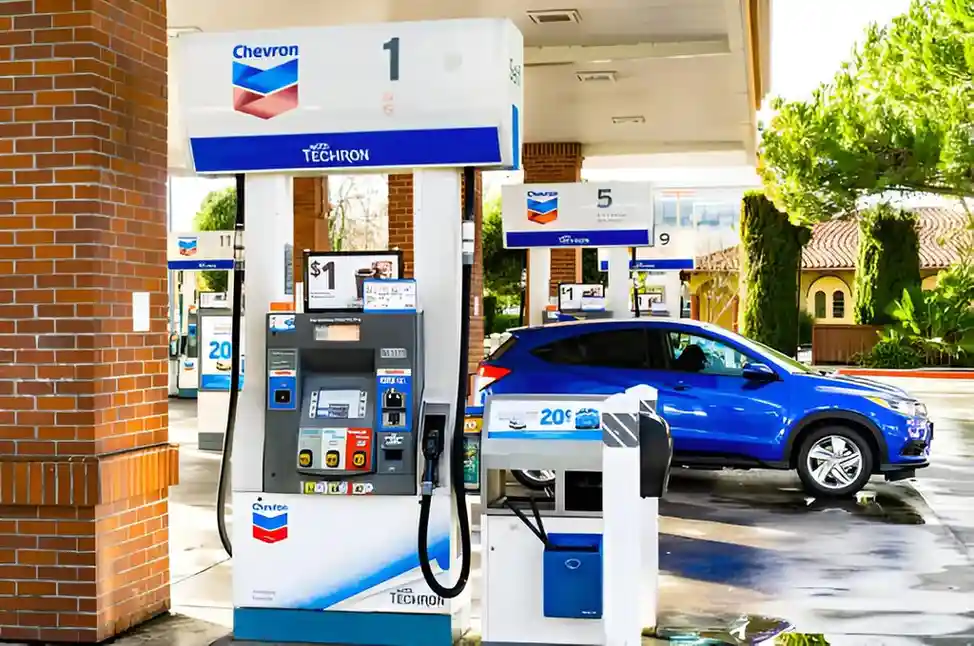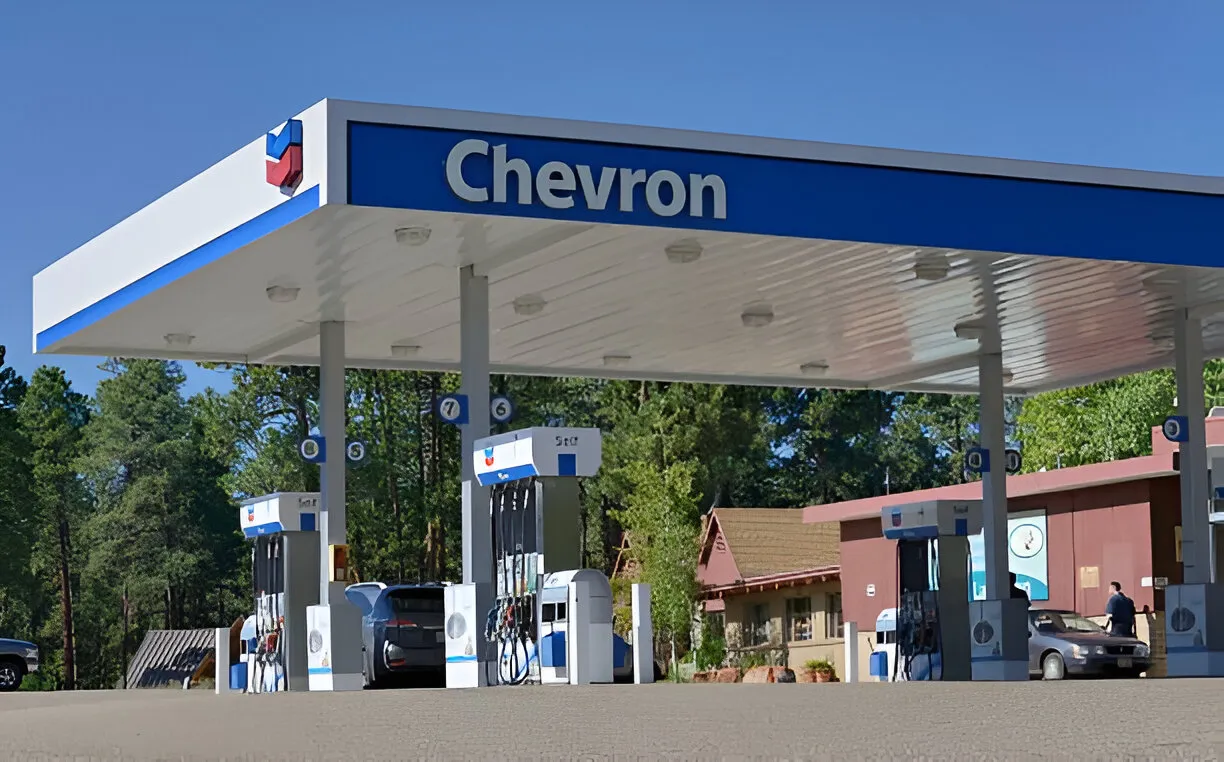Table of Contents
Many drivers often ask, “Why is Chevron more expensive than other gas brands?” While gas may seem the same everywhere, Chevron stands out due to its Techron additive, TOP TIER™ certification, and high-quality standards.
From cleaner engines to better service and eco-friendly practices, Chevron offers more than just fuel, and that added value reflects in the price.
In this article, we’ll explore what makes Chevron gas cost more and whether it’s worth the extra money.
It Starts with Techron: Chevron’s Unique Fuel Additive
One of the primary reasons Chevron gas costs more is a little ingredient called Techron. Techron is Chevron’s patented fuel additive, and it plays a huge role in why they market their gasoline as being better for your engine.
What Does Techron Do?

Techron isn’t just a marketing gimmick — it’s designed to clean your engine from the inside out. It helps remove and prevent carbon deposits from forming on key engine parts like fuel injectors, intake valves, and combustion chambers.
Over time, carbon buildup can reduce fuel efficiency, cause your engine to run rough, and even increase emissions.
By regularly filling up with Chevron gas containing Techron, your engine stays cleaner, potentially lasting longer and running more efficiently.
This kind of long-term benefit doesn’t come free, though. The development, production, and consistent mixing of Techron into Chevron’s fuel supply contribute to the higher price tag.
Chevron is a “TOP TIER” Brand — and That Matters
Another important factor behind Chevron’s premium pricing is its TOP TIER™ certification. This designation means that Chevron fuel meets or exceeds the standards recommended by leading automakers for optimal engine performance.
TOP TIER gasoline contains higher levels of detergents and cleaning agents than what’s legally required by the U.S. Environmental Protection Agency (EPA). Chevron doesn’t just meet these standards — it often exceeds them.
The company invests in maintaining that level of quality across all stations, and naturally, those costs are factored into the final price per gallon.
Consistent Quality and Fuel Cleanliness
Many drivers choose Chevron not because of the name, but because they trust the consistency. With some lesser-known or cheaper brands, fuel quality can vary from one station to the next.
That’s because many budget stations purchase unbranded fuel or change suppliers based on price.
Chevron, on the other hand, follows strict internal standards for fuel sourcing, handling, and delivery. From refinery to fuel tank, the product is monitored and tested.
This helps ensure that what you put in your car in Texas is just as clean and effective as what you buy in Oregon.
Maintaining that level of quality control requires a robust supply chain and detailed testing protocols — all of which cost money. Again, this is a key reason Chevron can’t compete with the rock-bottom prices of no-name fuel stations.
Read also: Traceloans.com Business Loans
Better Station Conditions and Service Standards
Ever notice how Chevron stations are often cleaner, more organized, and better lit than some other gas stations? That’s not a coincidence. Chevron holds its stations — whether company-owned or franchised — to high operational standards.
Many Chevron locations offer modern pumps, working card readers, clear signage, and well-maintained bathrooms. These aren’t luxuries, they’re part of the brand experience, and customers often pay a few cents more per gallon for that peace of mind and convenience.
Also, customer service and training expectations for station staff tend to be higher, which again translates to more operating costs and, in turn, higher fuel prices.
Prime Locations Come at a Price
Another factor you might not consider is location economics. Chevron stations tend to be in high-traffic areas — near major roads, shopping centers, and wealthier neighborhoods.
These areas typically have higher rent, real estate taxes, and maintenance costs.
Chevron isn’t choosing these locations randomly — they’re chosen strategically to match the company’s image of quality and reliability.
However, higher property and operational expenses mean that Chevron has to charge more just to break even, let alone make a profit.
So, when you’re paying more at a Chevron station, part of what you’re paying for is simply the station’s physical location and upkeep.
Chevron’s Investment in Clean Energy and Emissions Compliance
Chevron isn’t just a gasoline company — it’s also a global energy giant. Like all major energy firms, Chevron is under growing pressure to reduce its environmental impact, especially in environmentally progressive states like California.
To meet both government requirements and its own sustainability goals, Chevron invests heavily in:
- Emissions control and cleaner refining technologies
- Low-carbon fuel research
- Renewable energy projects
- Environmental safety and waste reduction programs
While these are good things in the big picture, they do increase operating costs. Chevron builds those costs into its pricing model. In contrast, budget stations that don’t invest as much in sustainability can keep prices lower, but that might mean their fuel is less eco-friendly or refined with fewer controls.
Brand Trust: You’re Paying for Reputation
Chevron’s price premium is also built on brand equity, in other words, the value of its reputation. Over the years, Chevron has earned customer loyalty by consistently delivering fuel that meets promises: better performance, cleaner engines, and reliable service.
That trust is hard to quantify but incredibly valuable. It’s why many people will drive past a cheaper gas station to fill up at a Chevron, especially if they drive a newer vehicle, a luxury car, or one they plan to keep for a long time.
Drivers feel more confident filling up with a brand they know and trust — and Chevron uses that to justify its higher pricing.
Is Chevron Worth the Extra Money?
This is the big question for most people. The short answer: it depends on your vehicle, budget, and how long you plan to keep your car.
When Chevron Might Be Worth It:
- You drive a newer car or a vehicle with direct fuel injection
- You want to maximize engine life and long-term fuel efficiency
- You care about emissions, sustainability, and cleaner driving
- You prefer top-tier customer service and station cleanliness
- You’re okay spending a little more for long-term peace of mind
When It Might Not Be:
- You drive an older car that’s less sensitive to fuel quality
- You’re focused on saving money in the short term
- You do most of your driving in areas where cheap gas is plentiful
- You don’t mind doing fuel system cleanings now and then
Ultimately, if you view fuel as more than just a cost — if you see it as a tool to protect your engine — then Chevron becomes a logical choice despite its higher price.
Final Words
Chevron is more expensive than other gas brands, not because it’s flashy or trying to rip people off, but because it offers a premium fuel product, backed by decades of research, higher quality additives, consistent standards, and a brand built on reliability and performance.
From Techron to station cleanliness to environmental investments, Chevron is charging for more than just gasoline, it’s selling long-term value and peace of mind.
If your budget allows and your vehicle can benefit, paying a little more for Chevron may save you money on repairs, fuel system cleaning, and performance issues in the long run.
Like anything else in life, you get what you pay for, and with Chevron, what you get is more than just a tank of gas.
People also ask
Which gas company has the highest quality gas?
Chevron is often rated highest due to its Techron additive, which helps clean engine deposits.
Is Chevron or Shell more expensive?
Chevron is usually slightly more expensive than Shell, mainly due to its Techron fuel additive.
Which is better, Chevron or Exxon gas?
Both offer Top Tier gas, but Chevron’s Techron gives it a slight edge for engine cleanliness and performance.
Are different brands of gas better?
Yes, Top Tier gas brands like Chevron, Shell, and Exxon include additives that help clean engines and improve performance.

